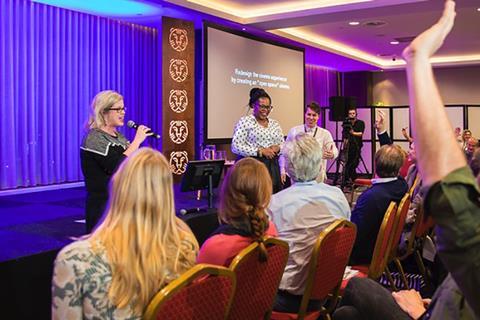
Four working groups at Rotterdam’s Reality Check conference came up with a list of actions that can improve content and audience diversity and engagement.
The closed working groups, each with up to 9 experts, presented their ideas in a public session that closed Reality Check, IFFR’s new distribution conference.
One especially popular suggested action point was creating a code of conduct for film festivals to have more diverse and inclusive juries, panel speakers and selection committees.
It was noted that festivals can do this immediately, on their own terms, without waiting for a global guideline to be established. Film experts were also encouraged to have their own personal code of conduct as well.
The other suggestions were:
- A card for young people to watch arthouse films in cinemas, at specific times of day, for a nearly-free payment, in a scheme that would be government subsidised.
- Creating a “label” that would signal that a film is diverse or inclusive, as a way for audiences to discover the film and behind the scenes for funders to know they are backing diverse works.
- Create an online film festival that lets normal audiences see films earlier than usual, perhaps concurrently to their festival premieres, and their comments can help guide cinema and festival programmers.
- Have smaller distributors and exhibitors share marketing resources (including sharing of employees), as well as sharing case studies and learnings.
- Have curatorial tools such as personal influencers (not just typical film critics) to help audiences navigate the crowded film market.
- Teach school children about film and filmmaking across the curriculum, from ages 6 to 16.
- Have audiences give feedback on film ideas at the project stage, for instance having non-professionals serve on a CineMart audience jury, giving feedback about films before they are produced.
- Think about cinemas as “open spaces” for socialising, dining, working, and serving as a community hub.
- Across Africa, develop local audiences by creating more cinematic experiences, whether at a fancy multiplex or more community screenings.
- Develop a curated newsletter to disseminate key information about African films for a local as well as international professional audience.
- Also working across Africa, develop a new film training programme to improve film production so that more films succeed at an international level.
Read more: How to grow film audiences? Make it easy for them, say experts
The working groups were:
Audience Diversity, looking at attracting culturally diverse audiences in Europe: Fatima Djoumer, Europa Cinemas; exhibitor Fabian Eck; filmmaker Philipp Maurice Raube; SK Global’s Winnie Lau; Brian Lo Sin Sjoe of the Dutch Performing Arts Fund; producer Kathrin Rodemeir; and Femke Veeman of EYE’s EXPOSED.
Content Availability, looking at distribution of audiovisual works across many platforms: Anke van Diejen of Herrie Film & TV; Ben Gibson of the German Film and Television Academy in Berlin; Marieke Jonker of Amstelfilm; EYE programmer Madé van Krimpen; and producer Eric Sonnenburg.
Content Diversity, about creating content an audience can relate to: filmmaker Mazen Aotabche; Moviefy co-founder Sophie Burger; Aramis Gonzalez of EYE EXPOSED; producer Oliver Krause; Kickstarter’s Elise McCave; Memento’s Tanja Meissner; and producer Friederike Weykamp.
Pan-African Distribution and Audience Engagement, as part of IFFR’s special pan-African programmes in 2018, looked at African film production and distribution both locally and internationally: filmmaker Munya Chidzonga; writer Claire Diao; Rushlake Media’s Philipp Hoffman; producer and EYE EXPOSED contributor Floor van Hulsen; Noel Kasyoka of The Nest Collective; producer Pedro Pimenta; and filmmaker Victoria Thomas.
Festival director Bero Beyer closed the conference by saying, “What we hoped for has happened, where a load of great ideas came forward and people discussed things openly and in a multitude of ways, and started what we as a festival are sometimes trying ourselves to do… It always takes many more people of whatever gender, whatever race, whatever background, whatever inspiration to come forward and to discuss these things openly.”

























No comments yet